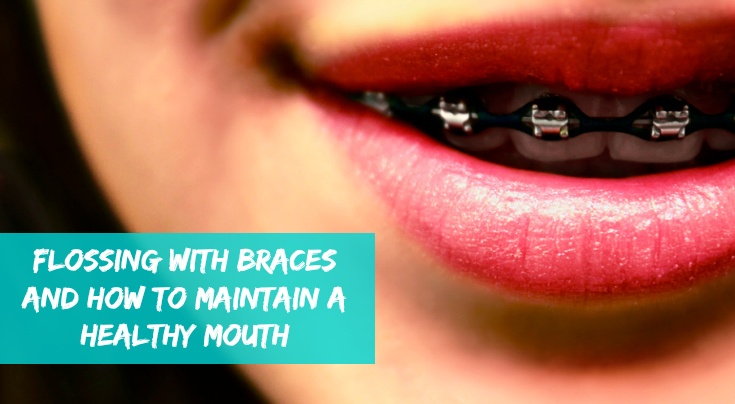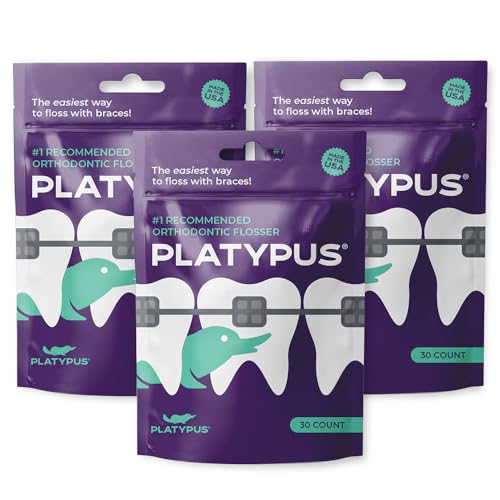Braces are an orthodontic staple for straightening teeth and fixing overbites or underbites for pre-teens, teens and adults. The thought of wearing braces evokes different reactions from different people – some fear the inevitable uncomfortable periods, some are excited to get braces to be like their friends, and others are hopeful that their smile will eventually look like an actor in a Hollywood film.
Regardless of your outlook on braces – fear or excitement – this orthodontic device comes with some strings attached. One concern by users, who are often middle-schoolers or teens, their parents, and dentists is how to keep teeth clean once the braces are firmly in place. Since investing in braces can run upwards of $7,000, everyone involved wants to ensure that the brackets and wires are effective and that the wearer achieves optimal oral hygiene during the years that the braces are working to do their job.
Isn’t brushing itself sufficient?
We all know that brushing two times per day is the minimum requirement for good oral hygiene; and with braces, you must set the bar even higher. Some people think that flossing with braces is too difficult or is nearly impossible, but this is a myth. Flossing keeps your teeth and gums healthy and is ever-more important when wearing braces to loosen any food particles between the brackets, wires, teeth and gums. Failure to remove these particles, especially sugars, can result in the formation of cavities. It is highly recommended to floss at least one-time per day for those with braces.
It is important for dentists, parents and the wearer to set realistic expectations when it comes to good dental hygiene while wearing braces. The wearer should expect to spend up to three times longer on brushing and flossing than before. It is imperative to give an equal time when cleaning all quadrants of the mouth, not just focusing on the front of the teeth that can be easily seen!
So how do you get in between all of those hard to reach places?
There are several options available for flossing effectively with braces, including:
- Traditional Flossing
- Platypus® Orthodontic Flossers
- Water Flossing
You may want to try each of these suggestions and then choose your favorite or mix and match as you move through your week. Just remember, you will need to set aside time, put forth an effort and be consistent when it comes to flossing every single one of your teeth (and gums) behind those braces. Additionally, once you are finished with your daily flossing, be sure to brush your teeth thoroughly, plus rinse with water and/or mouthwash.
Let us examine the aforementioned flossing options for ease of use and also evaluate cost.
Traditional Flossing
Get ready to pull a long strand of waxy thread from that floss container! Although flossing should be top of the list in most dental hygiene routines, it is often neglected; but for braces wearers, it is simply a must.

Ease of Use: The traditional flossing technique can often be difficult for those with braces as the user has to thread the floss under the wire of the braces to get in between teeth and gums. To make this task easier, it is recommended to incorporate into the routine an inexpensive floss threader, such as the DenTek Floss Threaders. When using the floss threader, simply guide the floss string – at least 18 inches long – through the loop and then use it to direct the floss under the wire of the braces, away from the gums, to prevent injury.
You’ll want to ensure you are using waxed floss; non-waxed floss tends to get caught on braces and leave behind shreds or remnants of string particles.
Cost: One big advantage of traditional flossing is that it is quite inexpensive. You can purchase a pack of floss threaders and approximately 5 packages of floss for under $20, which will last an entire year.
- Makes flossing around braces and dental work a breeze
- Simple loop fits any type of floss
- Flexible tip inserts into small spaces in a snap
Platypus® Orthodontic Flossers
Billed as “the easiest way to floss with braces,” these disposable flossers are a quicker alternative to traditional flossing, do not require a floss threader and are self-contained.


Ease of Use: This ready-to-use tool is designed to make it easier to navigate in between teeth, even with braces present. Using these flossers eliminates frustration due to ease of manoevrability and also cuts down on time, making the flossing process quicker. With consistent use, these small, disposable, plastic flossers promote cleanliness between teeth and gums.
Cost: A bit more than traditional flossing, but worth the investment for ease of use!
- Made in the USA
- EASY! Increases flossing compliance over 84%.
- SAFE! Patented structure uses the tooth’s anatomy to floss correctly, eliminating worry of damaging wires...
Water Flossing
Water flossing is a great alternative to traditional flossing when it comes to braces and is clinically proven to be 3x more effective.


Ease of Use: Waterpiks are easy to use and convenient – taking only 1-minute to floss your entire mouth! The pressure of the water stream easily loosens food particles even in between brackets and wires. There are several different types of Waterpik models, including countertop versions, such as the Waterpik Aquarius and cordless models, including the Waterpik Freedom. These flossers can also be equipped with a special Orthodontic Tip, specially made for getting in-between hard to reach spaces created by the brackets and wires of braces.
Cost: The initial investment in a Waterpik is more expensive than the other options we’ve assessed, but the ease of use and convenience of completing flossing within only 1-minute per day is an attractive option.
- ADVANCED WATER FLOSSING: Aquarius is a performance water flosser model featuring enhanced pressure with 10...
- HIGH VOLUME RESERVOIR AND SLIM HANDLE: Holds 22 ounces for 90 seconds of use, no refilling required. Small...
- DENTIST RECOMMENDED: 9 in 10 dental professionals recommend the Waterpik brand. Waterpik is clinically proven...
BONUS: Proxabrush
Consider beginning your flossing routine with a Proxabrush to remove some of the larger, stuck on food particles.
No products found.Great for getting in between tight spaces, this brush quickly removes food that gets caught amid the braces’ wire and in teeth; think leafy greens, corn kernels or sticky rice.
No products found.
With their small design, you can easily keep a few of these brushes in a purse, backpack or travel bag to use on the go!
No products found.
Conclusion
So what’s the best option?
The answer is a combination of all types of flossing. If you can afford a Waterpik, this option will be the easiest to use and save the most time – taking only 1-minute to complete and getting your entire mouth feeling fresh and clean. However, if the price is too steep, consider alternating between traditional flossing and the Platypus flossers to save money, a little bit of time and get some “ease of use” relief. The important thing to note is that you need to find the right solution for your routine. It’s imperative for a healthy mouth – especially when wearing braces – to properly floss at least one-time per day to keep teeth clean – even in those hard to reach areas.
Once committing to the expense of braces, it takes time and effort to make sure that you get the best results. Flossing everyday will help you achieve good dental hygiene, so realistically finding the best flossing option for yourself right from the beginning is important.
If you are constantly short on time, a Waterpik will be the best option for your busy lifestyle. If budget is a concern, traditional flossing might be your only option. And if you are readily on the move, consider keeping Platypus flossers in your purse, backpack, and car.
Whatever you decide, be consistent and remember that your dedication will pay off with a healthy, white and beautiful smile!
Last update on 2024-04-26 / Affiliate links / Images from Amazon Product Advertising API




2 thoughts on “Flossing with Braces”